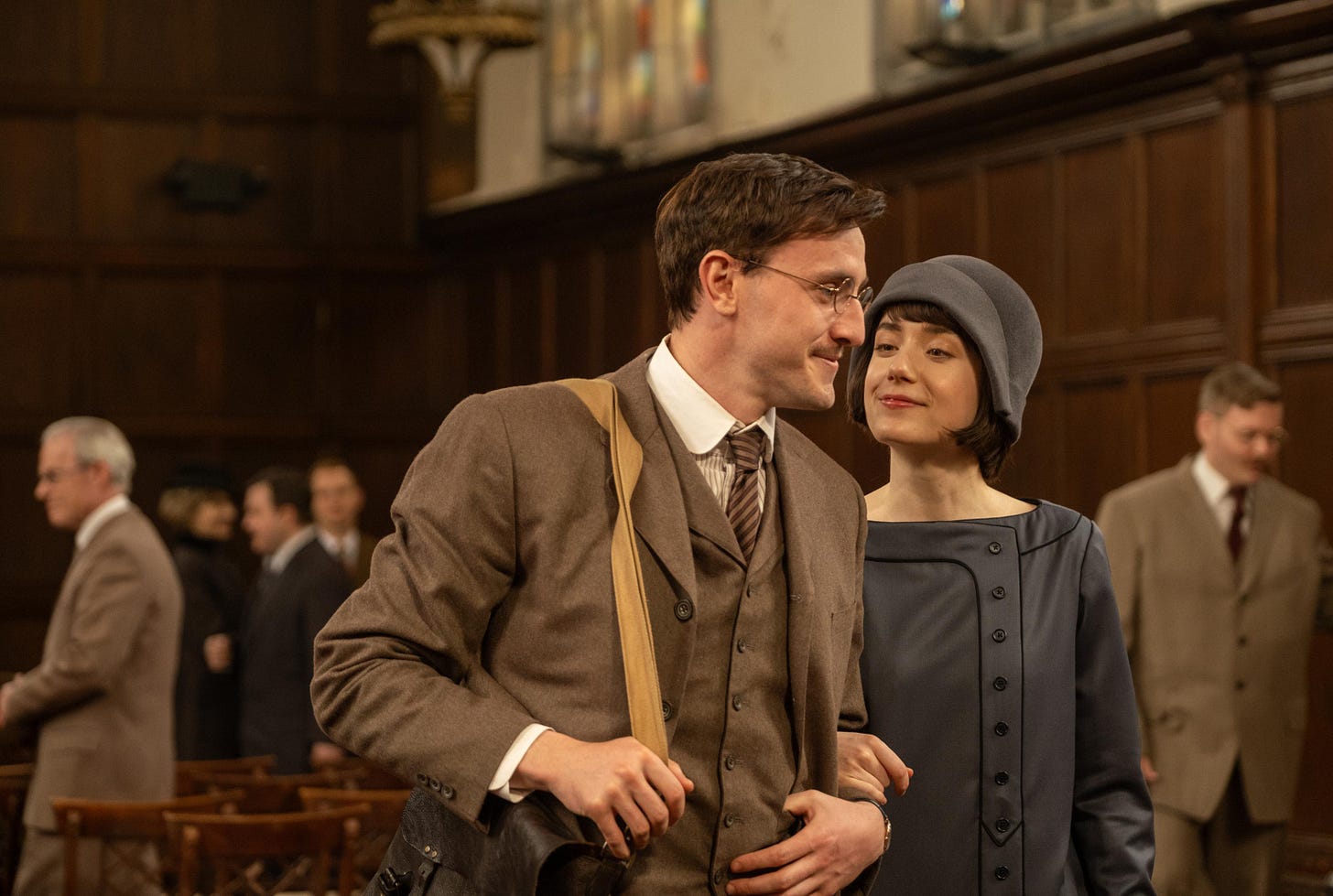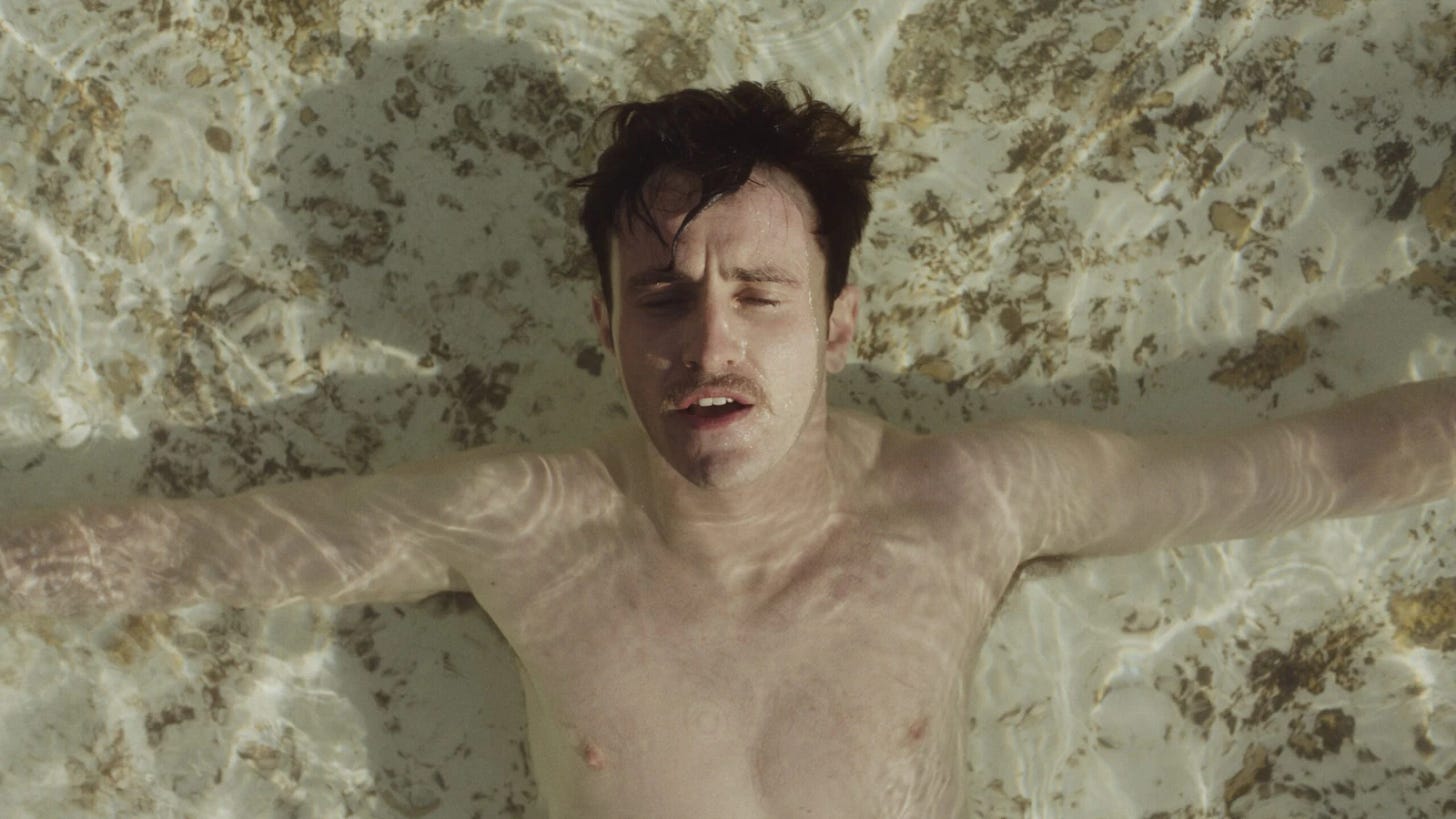Espectadores amam fabricar expectativas, e quando veem a escalação de Paul Mescal (de Todos Nós Desconhecidos) e Josh O’Connor (de Rivais) em uma história romântica, é bem provável que esperem uma história de amor e terminem frustrados com o drama do diretor sul-africano Oliver Hermanus (de Viver, a refilmagem do clássico de Akira Kurosawa). É que The History of Sound é um estudo de personagem mais do que só um romance clássico, embora a relação amorosa entre o cantor Lionel Worthing (Mescal) e o compositor David White (O’Connor) seja essencial no amadurecimento daquele. A frustração do espectador deveria estar menos associada ao romance água com açúcar, e mais com a inabilidade de Hermanus em explorar o potencial do protagonista ou da narrativa.
Desde quando ainda era criança, durante uma narração in off, aprendemos que Lionel tem a capacidade de ‘enxergar a música’. Apesar de este poder não ser reproduzido de uma forma visualmente interessante, está associado ao tema narrativo: um dispositivo chamado fonógrafo que permite que o som invisível seja impresso em um tubo de cera. O ‘poder’ de Lionel é democratizado, da mesma forma que as canções folclóricas (folk) recordadas por imigrantes pobres ou pessoas ex-escravizados — assisti a este filme já, o nome era Pecadores —, e eternizadas para a história. Uma pena que a engenhosidade do fonógrafo, durante a época pré-1ª Guerra Mundial, ou a celebração da arte musical na forma de registro da história dos povos, rapidamente deem espaço ao protagonista aborrecido e ao (já citado água com açúcar) romance, ou romances.
Eu já deveria ter percebido a partir da escolha de locação, com a paisagem de árvores secas, ou a direção de fotografia com coloração insaturada e amarronzada, mas estava ainda envolvido na aparência melancólica e, às vezes, até hipnótica presente nos sons ambiente ou nas canções folclóricas. É que os 20 ou 30 minutos iniciais de The History of Sound são promissores demais, mas resultam em uma obra mecânica, desprovida de paixão ou de força romântica. Muito disso é a culpa de Lionel, cuja característica mais marcante não é a voz doce, mas a insensibilidade de abandonar as pessoas queridas no momento que mais precisam dele: a mãe viúva, David, ou as experiências na Itália e na Inglaterra. Lionel é um sujeito cruel e egoísta, que foge não importa o que isto causará com quem se relaciona. Não ajuda o protagonista o semblante constante de bom moço de Paul Mescal, preparando-nos para a catarse do clímax, após 100 e tantos minutos, e o desejo de abandoná-lo bem ali mesmo.
O roteiro relaciona Lionel a Orfeu da mitologia, com o dom da melodia que encantou o deus do inferno, Hades, que o advertiu a não olhar para trás quando buscou a amada Eurídice no submundo. Lionel não olha para trás, a quem abandona, para não repetir o erro de Orfeu? Mesmo que seja isso, tenho bastante ressalvas com histórias iguais a essa que me castigam durante a duração da estrada na companhia de um protagonista insuportável, vivido por um ator cuja simpatia só reforça meu incômodo. Basta pegar a participação breve de Chris Cooper - só sabia que sentia saudades do ator depois de o rever -, com a de Paul Mescal. Diferentemente dele, Hermanus explora melhor o que Josh O’Connor pode proporcionar: um olhar enigmático, que ao menos tempo em que pode ser sensível, pode ser desafiador.
Contudo, Hermanus não é capaz de fabricar uma química onde não há sequer fagulha. O momento em que Lionel e David se conhecem em um bar, através da música que os aproxima, talvez seja o ápice do romance frígido. Se o roteiro de Ben Shattuck merece elogios por não problematizar a relação, apesar de a homofobia estar presente na época mesmo mais em um cenário rural, merece crítica por não desenvolver o romance, além de uma filial de O Segredo de Brokeback Mountain. Shattuck tem inclusive o equivalente da camisa guardada no armário de Ennis Del Mar, tendo chamado a atenção a timidez ou comedimento na encenação do sexo homossexual comparado com o heterossexual.
O lamentável é que The History of Sound tem decisões criativas emocionantes, nem que só pontualmente: a mãe de Lionel sorri somente na memória do filho. A edição de som que associa o rio calmo ao violino, e materializa o vento no sibilo característico, ou até o calor da brasa na chaminé está à altura da promessa de um filme que repercute o som além das ondas que propaga no ar. Contudo, é apenas lamentável que nem o estudo de personagem, nem o romance foram desenvolvidos com igual qualidade da fotogenia melancólica ou da expressividade da edição sonora. Talvez assim, The History of Sound tivesse algo a mais a dizer além de só ecoar dramas e romances melhores.
The History of Sound está na Seleção Oficial do Festival de Cannes de 2025.
English review
Viewers love to build expectations, and when they see Paul Mescal (from All of Us Strangers) and Josh O’Connor (from Challengers) cast in a romantic story, they’re likely to expect a love story and may end up disappointed with the drama from South African director Oliver Hermanus (from Living, the remake of Akira Kurosawa’s classic). The History of Sound is more of a character study than just a classic romance, although the love affair between singer Lionel Worthing (Mescal) and composer David White (O’Connor) is essential to the latter’s development. The viewer’s frustration should be less associated with the sugary romance and more with Hermanus’ inability to explore the potential of the protagonist or the narrative.
Ever since he was a child, during a voiceover, we learn that Lionel has the ability to ‘see music’. Although this power is not reproduced in a visually interesting way, it is associated with the narrative theme: a device called a phonograph that allows invisible sound to be printed on a wax tube. Lionel’s ‘power’ is democratized, in the same way as the folk songs remembered and immortalized for history by poor immigrants or former slaves — I’ve seen this film before, it was called Sinners . It’s a shame that the ingenuity of the phonograph, during the pre-World War I era, or the celebration of musical art as a form of recording the history of peoples, quickly give way to the bored protagonist and the (already mentioned) romance, or romances.
I should have already realized it from the choice of location, with the landscape of dry trees, or the cinematography with unsaturated and brownish colors, but I was still caught up in the melancholic and, at times, even hypnotic appearance present in the ambient sounds or folk songs. The first 20 or 30 minutes of The History of Sound are very promising, but they result in a mechanical work, devoid of passion or romantic strength. Much of this is Lionel's fault, whose most striking characteristic is not his sweet voice, but his insensitivity in abandoning the people he loves at the moment they need him most: his widowed mother, David, or his experiences in Italy and England. Lionel is a cruel and selfish guy, who runs away no matter what it will do to those he is related to. The protagonist is not helped by Paul Mescal's constant good-guy appearance, preparing us for the catharsis of the climax, after 100 or so minutes, and the desire to abandon him right there.
The script relates Lionel to Orpheus from mythology, with the gift of melody that enchanted the god of hell, Hades, who warned him not to look back when he sought his beloved Eurydice in the underworld. Does Lionel not look back at the people he abandons, so as not to repeat Orpheus' mistake? Even if that’s the case, I have a lot of reservations about stories like this one that punish me during the entire trip in the company of an unbearable protagonist, played by an actor whose likeability only reinforces my discomfort. Just look at the brief appearance of Chris Cooper – I only knew I missed the actor after seeing him again – and Paul Mescal. Unlike him, Hermanus explores better what Josh O’Connor can provide: an enigmatic look, which at the same time as it can be sensitive, can be challenging.
However, Hermanus is not capable of creating chemistry where there is not even a spark. The moment when Lionel and David meet in a bar, through the music that brings them together, is perhaps the peak of the frigid romance. If Ben Shattuck’s script deserves praise for not problematizing the relationship, despite the homophobia being present at the time, even more so in a rural setting, it deserves criticism for not developing the romance, as well as only mimicking Brokeback Mountain. Shattuck even has the equivalent of the shirt stored in Ennis Del Mar's closet, having drawn my attention to the shyness or restraint in the staging of homosexual sex compared to heterosexual sex.
The unfortunate thing is that The History of Sound has exciting creative decisions, even if only occasionally: Lionel's mother smiles only in the memory of her son. The sound editing that associates the calm river with the violin, and materializes the wind in the characteristic hiss, or even the heat of the embers in the chimney lives up to the promise of a film that reverberates sound beyond the waves it propagates in the air. However, it is only unfortunate that neither the character study nor the romance were developed with the same quality as the melancholic photogenicity or the expressiveness of the sound editing. Perhaps then, The History of Sound would have something more to say than just echoing better dramas and romances.






